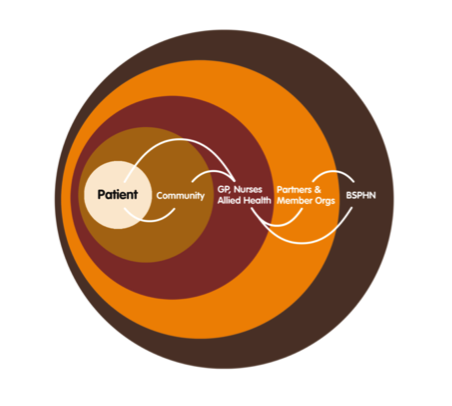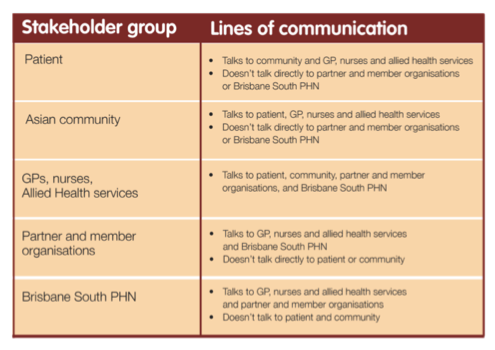Co-design of a Community Engagement Framework for a Primary Health Network to better engage and service the health needs of its Culturally and Linguistically Diverse population.
Deepening connections through targeted community engagement
Everywhen was engaged by a Primary Health Network (PHN) to explore and gather key information from one of the region’s diverse populations, its Asian community. The purpose of the engagement was to understand and acquire a deeper knowledge of this diverse community – its strengths, assets, challenges, and opportunities, in order to inform future decision making of the PHN.
The PHN region occupies one of the largest Culturally and Linguistically Diverse (CLAD) communities in Australia, with almost 30% of the state’s population born overseas living in the region and at least 8% identify as speaking an East Asian language at home.
The PHN in collaboration with Everywhen acknowledged that greater targeted understanding of the diversity groups which make up the region is needed, in order to better understand the health needs of the communities. This is consistent with the purpose and function of the PHN as an influencing and commissioning body which takes a people and place-based approach when considering the health needs of community and the allocation of resourcing.
The objectives of this engagement also served a broader purpose for the PHN through:
- Testing and validation of a community engagement approach to inform the build of a CALD Community Engagement Framework
- Gathering of intelligence to create a greater understanding of the interdependencies between health and social determinants, relevant to the region
- Compilation of data to guide and inform program priorities for the new PHN Health Needs Assessment
Adopting an interactive approach to build trust and establish lines of communication
Multicultural communities can often be classified as vulnerable due to the complexity of social determinants and their impact on health and wellbeing outcomes. This is further compounded by perceived barriers in and challenges with meaningful interpretation, feeling culturally safe, accessing care and the lack of integration and continuity of care.
Everywhen wanted to test these assumed barriers through a structured methodology that enabled a community based participatory research approach, working with community, organisational representatives, and researchers to improve health and wellbeing through acting, including social change.
Everywhen highlighted two priorities for our engagement:
- the sharing of power between research and community
- the sharing of control over individual and group health ‘social conditions’
Our approach utilising this methodology enabled us to identify and engage with key community stakeholders through the establishment of mutually equitable relationships that built on community strengths and resources. Key community activities included:
- Community engaged mapping
- Interviews
- Focus Groups
- Shared knowledge and learning sessions
Through this process we were able to refine research questions and our data collection methods through ongoing collaboration and purposeful sharing of skills and knowledge.
In order to facilitate this engagement, gain quality insights and test our hypothesis we need to first establish Circles of Trust and Lines of Communication, as show below:


Our engagement sought to gather intelligence to inform the build of an engagement framework
Following key lines of enquiry, we were able to test our Theory of Change and achieve the below objectives.
Theory of Change:
The PHN’s investment in a CALD community engagement plan will increase trust and improve communication with one of its vulnerable populations. This will contribute to better health outcomes for multicultural and refugee communities. The research and mapping produced from the plan will enable a CALD community engagement framework to be designed and implemented. The framework will provide a structural guide and methodology to deepen engagement with all vulnerable communities and ensure better health outcomes are achieved.
Objectives achieved as a result of engagement:
- Develop a deeper understanding of the PHN’s Asian population.
- Identify Asian community groups or individuals who may not be accessing services equitably.
- Identify opportunities for Asian community groups and individuals, and other key stakeholders to inform this process.
- Identify opportunities to better align CALD engagement plans with PHN’s four goals listed in its Needs Assessment: (access and navigation, health literacy, health workforce and technology and data).
- Provide recommendations for the build of a CALD engagement framework, including an action plan with co-determined metrics.
- Cultivate an engagement approach based on shared knowledge and power.
Generating better health outcomes for multicultural and refugee communities
Insights and evidence gathered over this research and mapping engagement project have supported the co-design of a community engagement framework. These principles and learnings have been adopted to better connect with a range of diverse community groups and key stakeholders.
The community engagement framework has been designed to increase community influence on the PHN’s decision making process, by embedding the following guiding principles:
- Inform – provide community with health information in ways that enable understanding and interpretation.
- Listen – actively and thoroughly absorb community feedback on questions, findings, and decisions.
- Enable – work directly with community to ensure their concerns and aspirations are consistently understood and considered in the decision making process.
- Empower – place final decision making responsibilities in the hands of the community.
- Evaluate – with community to co-determine metrics of success and value, to ensure the right things are measured, with the right metrics, at the right time, the right way.
